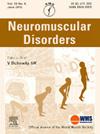03PA研究肌肉活检病例抗胞浆5′-核苷酸酶1A抗体阳性
IF 2.8
4区 医学
Q2 CLINICAL NEUROLOGY
引用次数: 0
摘要
抗胞质5′-核苷酸酶1A(抗cn1a)抗体已知与包涵体肌炎(IBM)有关。但也有非典型患者,其临床症状和病理表现与IBM典型病例不同。此外,抗cn1a抗体有时在肌萎缩性侧索硬化症(ALS)的血清中检测到。最近,与肌炎相关的自身抗体,包括抗cn1a抗体,可以通过自身抗体阵列分析检测到。在这项研究中,我们评估了抗cn1a抗体阳性的肌肉活检病例的特征。我们评估了2023年1月至2024年12月32例患者的临床病理特征。采用肌肉活检和自身抗体阵列法进行血清学检测。12例患者检测到抗cn1a抗体;12例患者中有5例被诊断为IBM。IBM组抗体滴度为397.9±268.7,非IBM组为81.4±41.7 (p=0.011)。非ibm组2例患者同时检测到肌炎特异性抗体(抗srp或抗hmgcr抗体)和抗ss - a抗体,临床病理诊断为免疫介导的坏死性肌病(IMNM)。12例抗cn1a抗体患者中,5例单独抗cn1a抗体阳性,2例诊断为IBM, 2例血清阴性IMNM合并恶性肿瘤,1例ALS。抗cn1a抗体在IBM的诊断中是有用的,但抗cn1a抗体本身没有什么病理意义,抗体水平的升高可能与有无病理相关。本文章由计算机程序翻译,如有差异,请以英文原文为准。
03PA study of muscle biopsy cases positive for anti-cytosolic 5′-nucleotidase 1A antibodies
Anti-cytosolic 5′-nucleotidase 1A (anti-cN1A) antibodies are known to be related with inclusion body myositis (IBM). However, there are atypical patients whose clinical symptoms and pathological findings are different from typical cases of IBM. In addition, anti-cN1A antibodies are sometimes detected in serum of amyotrophic lateral sclerosis (ALS). Recently, autoantibodies associated with myositis, including anti-cN1A antibodies, can be detected by the Autoantibody Array Assay. In this study, we evaluated the characteristics of muscle biopsy cases positive for anti-cN1A antibodies. We evaluated clinicopathological characteristics of 32 patients from January 2023 to December 2024. They were examined by muscle biopsy and serological test by the Autoantibody Array Assay. Anti-cN1A antibodies were detected in 12 patients; 5 of the 12 patients were diagnosed with IBM. Antibody titers were 397.9±268.7 in the IBM group and 81.4±41.7 in the non-IBM group (p=0.011). Two patients in the non-IBM group had myositis-specific antibodies (anti-SRP or anti-HMGCR antibodies) and anti-SS-A antibodies detected simultaneously and were diagnosed as immune–mediated necrotizing myopathy (IMNM) clinicopathologically. Among 12 patients with anti-cN1A antibodies, five patients were positive for anti-cN1A antibodies alone, and two were diagnosed with IBM, two with seronegative IMNM complicated by malignancy, and one with ALS. Anti-cN1A antibodies are useful in the diagnosis of IBM, but anti-cN1A antibodies themselves have little pathological significance, and antibody levels may be elevated in correlation with the presence or absence of pathology.
求助全文
通过发布文献求助,成功后即可免费获取论文全文。
去求助
来源期刊

Neuromuscular Disorders
医学-临床神经学
CiteScore
4.60
自引率
3.60%
发文量
543
审稿时长
53 days
期刊介绍:
This international, multidisciplinary journal covers all aspects of neuromuscular disorders in childhood and adult life (including the muscular dystrophies, spinal muscular atrophies, hereditary neuropathies, congenital myopathies, myasthenias, myotonic syndromes, metabolic myopathies and inflammatory myopathies).
The Editors welcome original articles from all areas of the field:
• Clinical aspects, such as new clinical entities, case studies of interest, treatment, management and rehabilitation (including biomechanics, orthotic design and surgery).
• Basic scientific studies of relevance to the clinical syndromes, including advances in the fields of molecular biology and genetics.
• Studies of animal models relevant to the human diseases.
The journal is aimed at a wide range of clinicians, pathologists, associated paramedical professionals and clinical and basic scientists with an interest in the study of neuromuscular disorders.
 求助内容:
求助内容: 应助结果提醒方式:
应助结果提醒方式:


